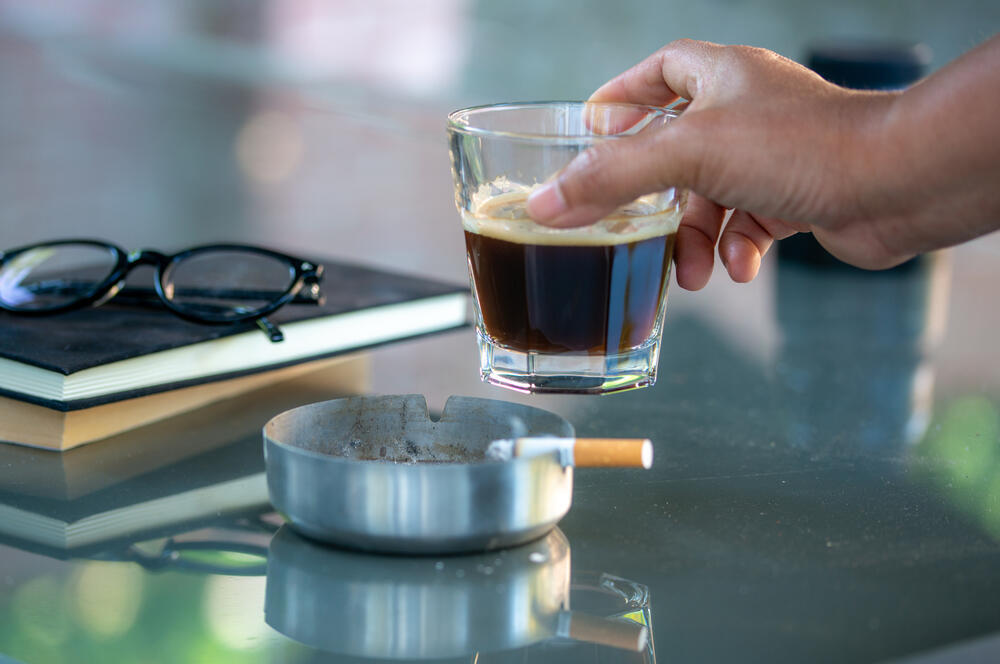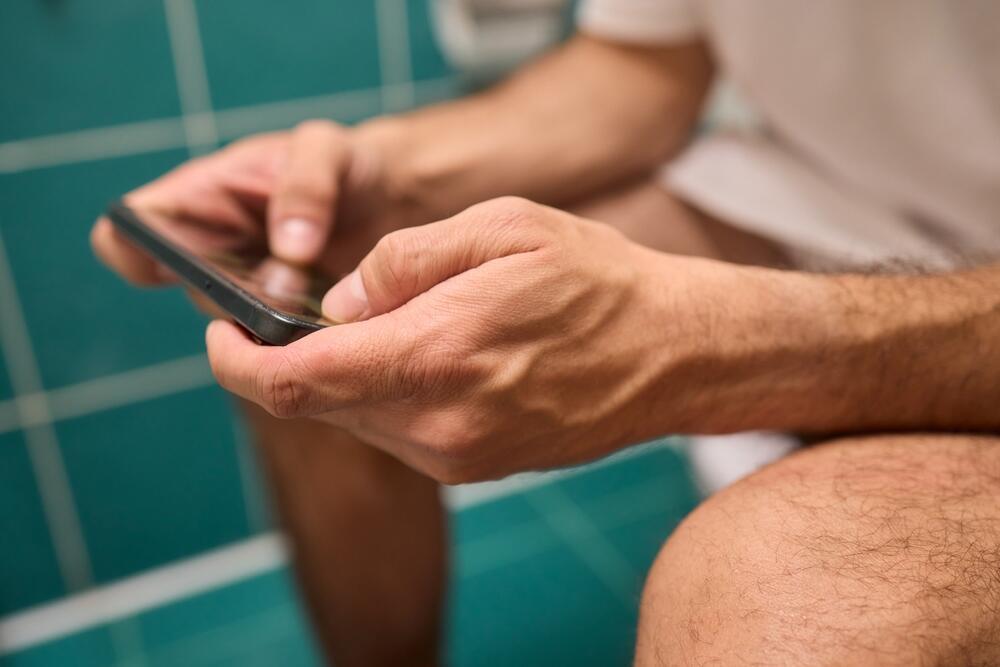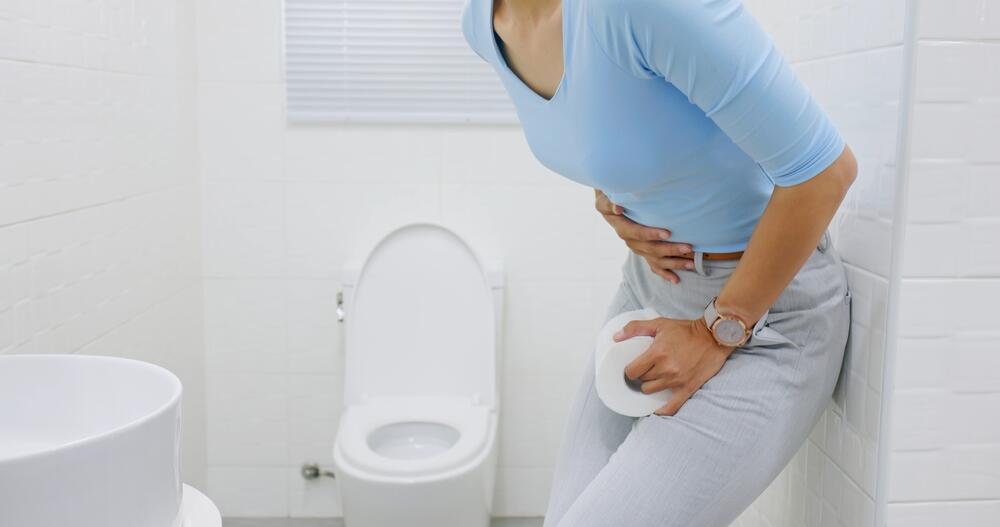In the past, people might have taken a newspaper or puzzle book for a few quiet minutes in the restroom. Today, the smartphone has taken that place, creating a new problem: much longer bathroom stays. Scrolling through social media or reading the news makes it easy to lose track of time, and every extra minute on the toilet adds unnecessary pressure on the rectum. That pressure builds up and can cause hemorrhoids, a painful condition that may involve itching and bleeding.
Cases of hemorrhoids are rising among younger people, and a common habit may be one of the reasons: using a smartphone on the toilet.
The new study, published in the medical journal PLOS One, found that phone use while sitting on the toilet raised hemorrhoid risk by 46%. The research was conducted at Beth Israel Deaconess Medical Center, a teaching hospital affiliated with Harvard Medical School.
The study included 125 adult participants who had undergone screening colonoscopies and filled out questionnaires on bathroom habits, including phone use, diet, exercise and straining. Hemorrhoids were diagnosed using endoscopy, an exam of the digestive tract.
Of all respondents, 66% used smartphones while on the toilet, and spent significantly more time there than those who did not. The most common activity performed by more than half (54%) was reading the news, followed by “social media” (44%).
The difference was striking: 37% of smartphone users were spending more than five minutes per visit on the toilet, compared to only 7% of non-smartphone users.
“I’ve been warning my patients for years not to take their phones into the restroom,” said Dr. Benjamin Person, a senior colorectal surgeon and proctologist at the Haifa district.
“Using the phone simply extends the time you spend sitting,” Person said. “And the longer you remain in that posture, the higher the risk of hemorrhoids. What used to be professional intuition is now supported by research data.”
Can the findings apply to younger people?
Although the research focused on adults 45 and older, Person said the findings likely apply to younger people as well, since they tend to take their phones everywhere. Along with a low-fiber diet and obesity, toilet scrolling is now seen as another risk factor.
Why does the phone make it worse?
The main problem is prolonged sitting. Unlike a solid chair, the toilet seat does not support the pelvic floor, allowing blood to pool in the rectal area and increase pressure. That pressure creates conditions for hemorrhoids to develop.
Moreover, phone use also encourages people to lean forward, a posture that makes bowel movements less smooth. By contrast, squatting creates a better angle that reduces strain.
The study found that key risk factors were not associated with constipation or straining, but the length of time spent sitting. Passive phone use led to swelling in the rectal tissue, which can protrude and develop into hemorrhoids.
“The advice is simple,” Person said. “Do not take your phone into the toilet. Once it’s in your hands, you end up staying longer, thus increasing the risk of hemorrhoids.”
If you do bring it in, he added, try to limit the time. Current guidelines recommend no more than three to five minutes per visit. A timer can help, or even limiting yourself to two TikTok clips. The important thing is not to linger on the toilet.
Another habit that can make the problem worse is holding it in. “When your body tells you it’s time, you need to listen,” said Dr. Fahmi Shibli, head of the neurogastroenterology unit at Emek Medical Center.
“The urge to go to the toilet is a natural response to nerve signals. If you ignore it repeatedly, you train your body to think it’s not the right time, and the brain stops sending those signals.”
Shibli explained that repeatedly postponing bowel movements disrupts the physiological connection between the gut and the brain. “It’s an entire neural pathway that begins at the end of the digestive tract and communicates with centers in the brain. When that pathway is damaged, the result is chronic constipation.”
Delaying visits to the toilet affects people of all ages but often starts early, Shibli said – children who are embarrassed to use the school bathroom, soldiers who cannot relieve themselves in the field, or employees who prefer to “wait until they get home.”
Women, he added, suffer more often, partly because of greater sensitivity about hygiene and embarrassment around the subject.
Not all cases of holding it in involve embarrassment. Sometimes it stems from fear of pain caused by conditions such as fissures, hemorrhoids or other discomfort, Shibli noted. “That only makes the problem worse,” he explained. “Any such pain requires evaluation and treatment, or else, it creates a ‘vicious cycle’ of constipation, bleeding and hemorrhoids.”
Parents, he said, need to teach their children not to be ashamed. “You have to talk to them, notice if they’re holding it in, and tell them it’s OK to ask to go, that it’s not embarrassing. It’s essential.”
As for adults, he says, “There’s nothing unusual here. Don’t hold it in just because you have one more email to answer at work. You’re harming your body and training it to stop asking.”
* Listen to your body and go to the toilet as soon as you feel the urge
* Drink plenty of water to soften stool
* Eat fiber-rich foods such as vegetables, fruits, legumes and whole grains
* Don’t fear or feel disgusted by the subject – it’s natural and important
Sometimes, the solution starts with caffeine. “Coffee stimulates the digestive system,” Shibli said. “It contains not just caffeine but also compounds that activate nerve pathways in the intestines. That’s why many people drink coffee and immediately feel the need to go to the toilet.”
3 View gallery


Coffee and cigarettes act as stimulants and help trigger bowel movements
(Photo: Shutterstock)
For some, it becomes so routine that they cannot go without coffee. “It’s a conditioned response,” Shibli explains.
Smoking, though absolutely not recommended, works the same way. Nicotine stimulates receptors in the intestines, which is why a morning cigarette often triggers the urge.”
But Shibli warned that this is not a long-term solution. “It can make you dependent on coffee or cigarettes, and that’s not healthy. Once you quit smoking, the effect disappears. It’s better to rely on natural solutions that don’t involve stimulants.”
The bottom line: Don’t hold it in. Go when your body tells you to, and when you do, avoid sitting on the toilet longer than a few minutes. Ignoring your body’s signals leads to constipation, hemorrhoids and lasting damage to quality of life.



